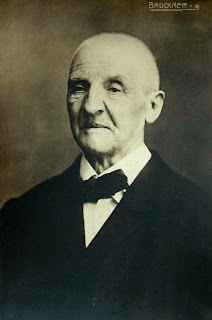Information
Composer: Anton Bruckner
CD1:
Karita Mattila, soprano (Te Deum)
Susanne Mentzer, mezzo-soprano (Te Deum)
Vinson Cole, tenor (Te Deum)
Robert Holl, bass (Te Deum)
Bavarian Radio Chorus (Te Deum)
Vienna Philharmonic Orchestra (Te Deum)
Royal Concertgebouw Orchestra (Nos. 1 & 9)
Bernard Haitink, conductor
Date: 1965 (No. 9), 1972 (No. 1), 1989 (Te Deum)
Label: Philips
http://www.deccaclassics.com/us/cat/4738862
CD1:
- Te Deum for soloists, chorus & orchestra: 1. Te Deum laudamus
- Te Deum for soloists, chorus & orchestra: 2. Te ergo
- Te Deum for soloists, chorus & orchestra: 3. Aeterna fac
- Te Deum for soloists, chorus & orchestra: 4. Salvum fac
- Te Deum for soloists, chorus & orchestra: 5. In te, Domine, speravi
- Symphony No. 1 in C minor (1877 Linz, ed. Haas): 1. Allegro molto moderato
- Symphony No. 1 in C minor (1877 Linz, ed. Haas): 2. Adagio
- Symphony No. 1 in C minor (1877 Linz, ed. Haas): 3. Scherzo. Lebhaft
- Symphony No. 1 in C minor (1877 Linz, ed. Haas): 4. Finale. Bewegt und feurig
- Symphony No. 9 in D minor (1894, ed. Nowak): 1. Feierlich. Misterioso
- Symphony No. 9 in D minor (1894, ed. Nowak): 2. Scherzo (Bewegt lebhaft) - Trio (Schnell) - Scherzo da capo
- Symphony No. 9 in D minor (1894, ed. Nowak): 3. Adagio (Langsam, feierlich)
Karita Mattila, soprano (Te Deum)
Susanne Mentzer, mezzo-soprano (Te Deum)
Vinson Cole, tenor (Te Deum)
Robert Holl, bass (Te Deum)
Bavarian Radio Chorus (Te Deum)
Vienna Philharmonic Orchestra (Te Deum)
Royal Concertgebouw Orchestra (Nos. 1 & 9)
Bernard Haitink, conductor
Date: 1965 (No. 9), 1972 (No. 1), 1989 (Te Deum)
Label: Philips
http://www.deccaclassics.com/us/cat/4738862
----------------------------------------------------------------------------
Review
Great Early Haitink in both Early and Late Bruckner
-- Victor Carr Jr., ClassicsToday
More reviews:
http://www.amazon.co.uk/Bruckner-Symphonies-Deum-Bernard-Haitink/dp/B0000942JV
This is the second of two Bruckner Te Deum's that Bernard Haitink recorded for Philips. In contrast to his rather uninspiring 1960s version, his later 1988 reading has that right mix of piety, passion, and grandiloquence that make Bruckner's work so moving and memorable. Soloists Mattila, Mentzer, Cole, and Holl all offer expressive and beautifully toned singing, while the rich-sounding Bavarian Radio Chorus sings with a heartwarming fervor. The Vienna Philharmonic provides characteristically fulsome and polished playing throughout, and the recording nicely balances the assembled forces, including the organ, which fits comfortably into the sonic mix.
Haitink conducts a sharp and lean Symphony No. 1, with quick tempos that project a vibrant, youthful quality that belies the fact that the composer was in his early 40s when he wrote it. The Concertgebouw brass sound is brighter of timbre than that of the Vienna Philharmonic, but it has a piercing power that's particularly effective in the first movement (the trombone's big tune rings out with real splendor). Meanwhile the strings offer sumptuous sonorities of their own in the poignant Adagio, and the whole is captured in Philips' warm and spacious 1970s analog sound.
This 1965 Ninth is a classic rendition that, along with Zubin Metha's Vienna recording, was a prime recommendation during the LP era. Haitink's cogent conducting draws together the seemingly disparate sections of Bruckner's massive first movement and gives the music a dramatic focus (his rhythmic timpani-beats in the coda are an original and striking effect). The slightly slower than usual Scherzo emphasizes that movement's grandiose humor, while the shimmering Concertgebouw strings lend the closing Adagio a transcendent radiance. Haitink topped himself in the 1980s with an even more gripping rendition that featured powerfully dark sonorities from the Concertgebouw, along with more striking recorded sound. But this earlier version accurately conveys the conductor's uniquely affective way with the score--especially in this clear, solid, and finely detailed remastering.
-- Victor Carr Jr., ClassicsToday
More reviews:
http://www.amazon.co.uk/Bruckner-Symphonies-Deum-Bernard-Haitink/dp/B0000942JV
----------------------------------------------------------------------------
Anton Bruckner (4 September 1824 – 11 October 1896)) was an Austrian composer. His symphonies are considered emblematic of the final stage of Austro-German Romanticism because of their rich harmonic language, strongly polyphonic character, and considerable length. Bruckner composed eleven symphonies, scored for a fairly standard orchestra. His orchestration was modeled after the sound of his primary instrument, the pipe organ.
***
Bernard Haitink (born 4 March 1929) is a Dutch conductor. In his glowing career, he is the principal conductor of the Royal Concertgebouw (1959-1988), London Philharmonic (1967-1979), Chicago Symphony (2006-2010) and and principal guest conductor Boston Symphony (1995-2004). Haitink has conducted and recorded a wide variety of repertoire, with the complete symphonies of Beethoven, Brahms, Schumann, Tchaikovsky, Bruckner, Mahler, Shostakovich and Vaughan Williams, and the complete piano concertos of Beethoven and Brahms with Claudio Arrau notable among his recordings.
----------------------------------------------------------------------------
FLAC, tracks
Links in comment
Enjoy!



CD1
ReplyDeleteMEGA
http://adf.ly/1YyxjJ
CD2
MEGA
http://adf.ly/1YyxjK
¡Muchas gracias, Ronald Do!
ReplyDeletemercei beacoup!
ReplyDelete